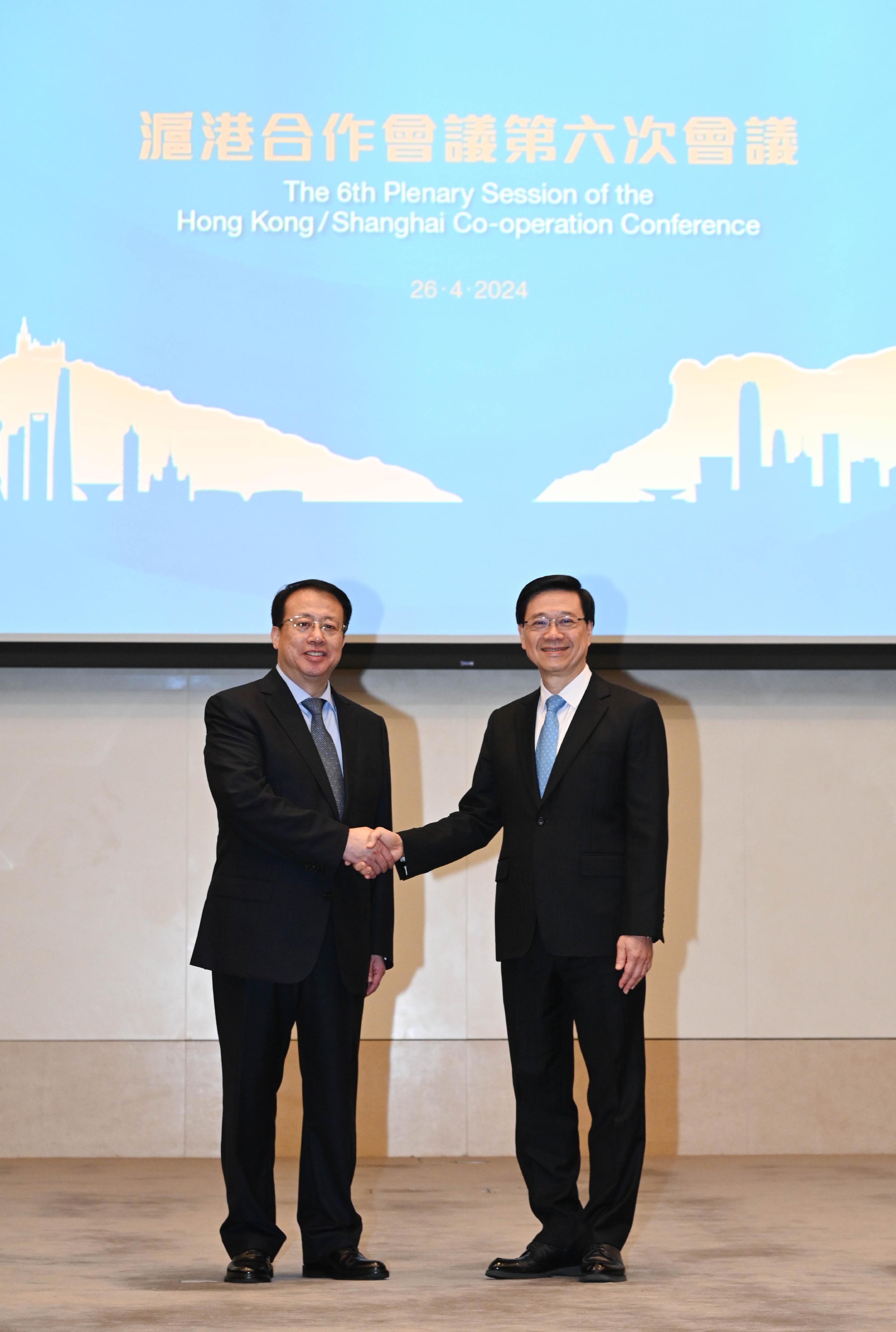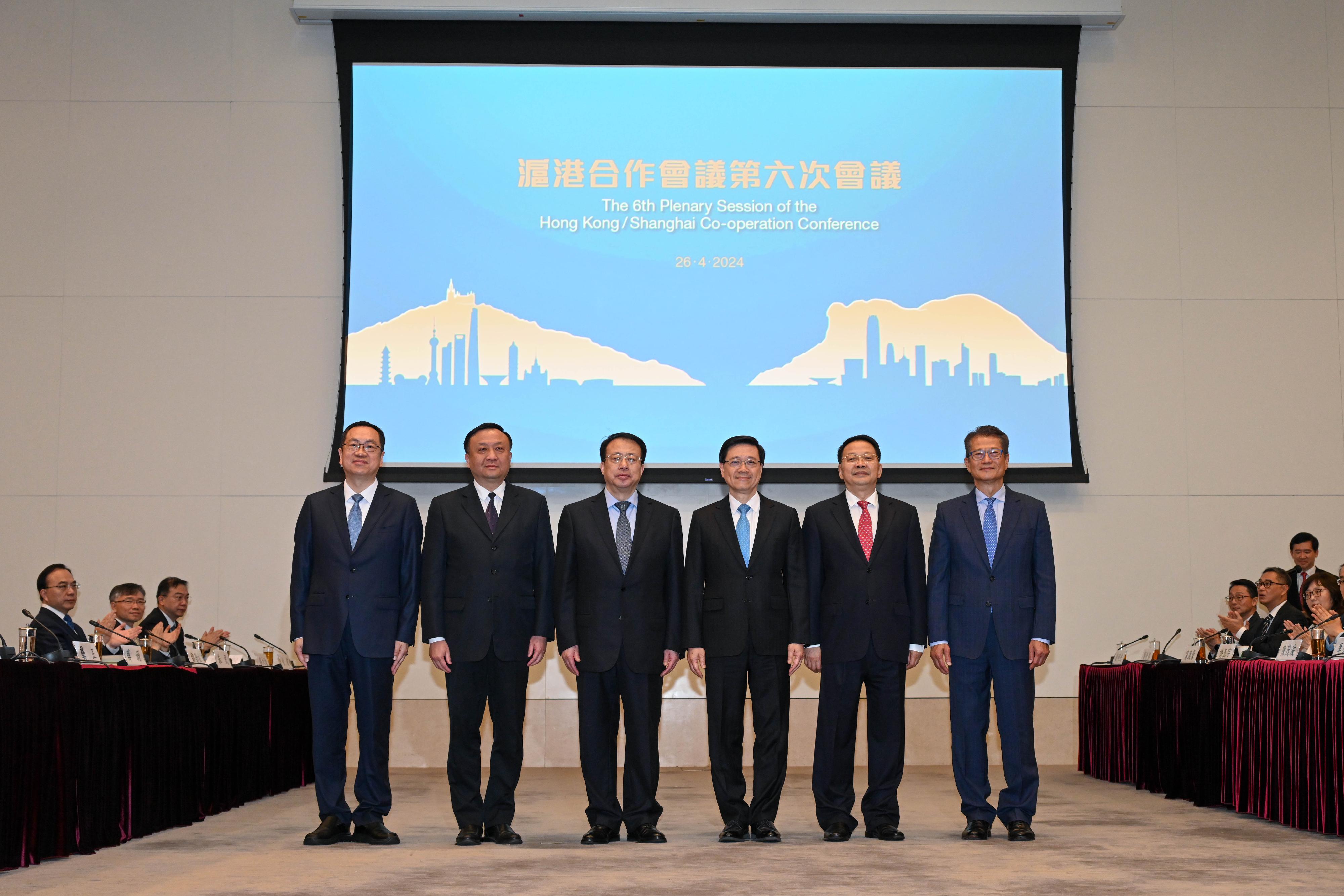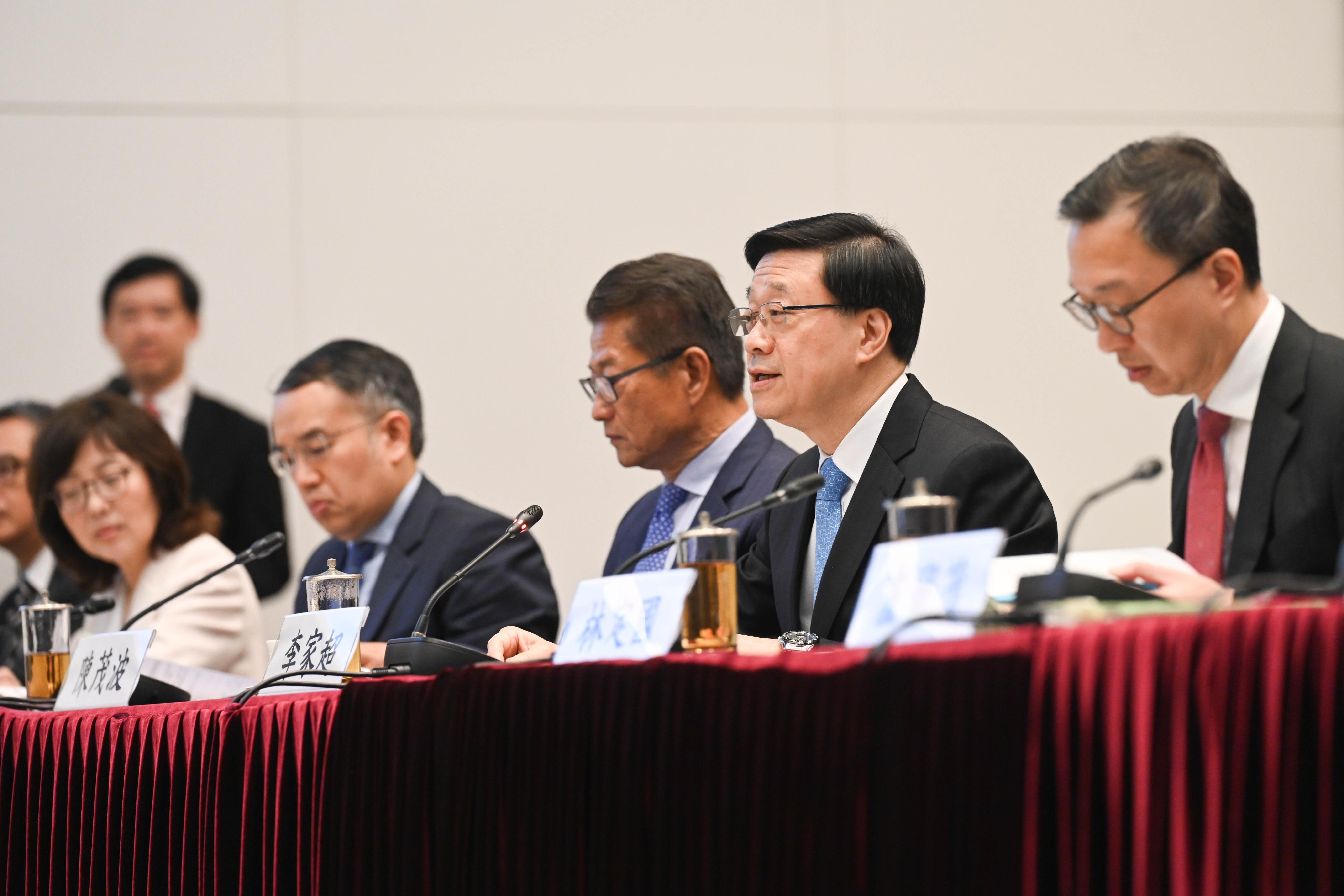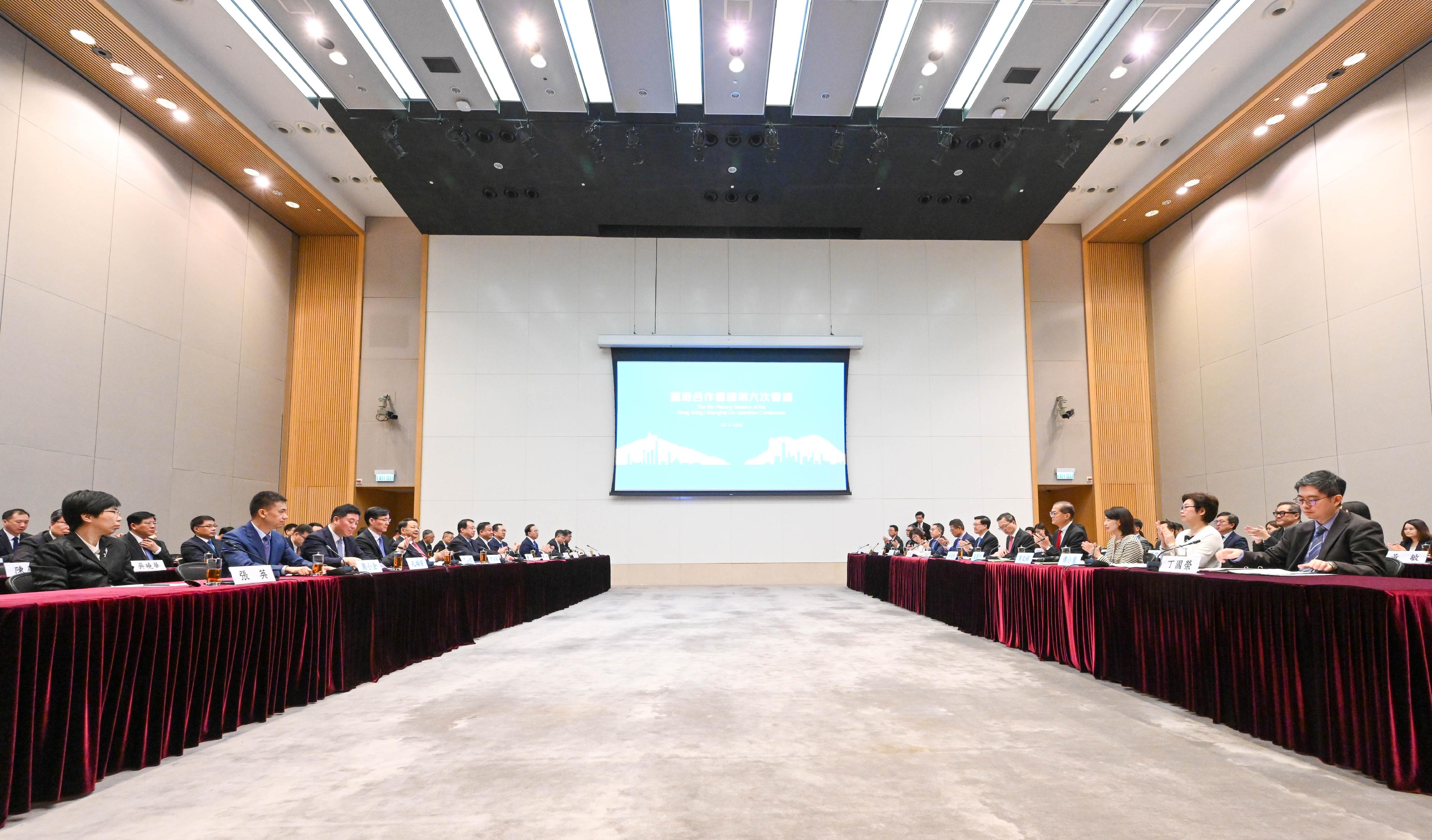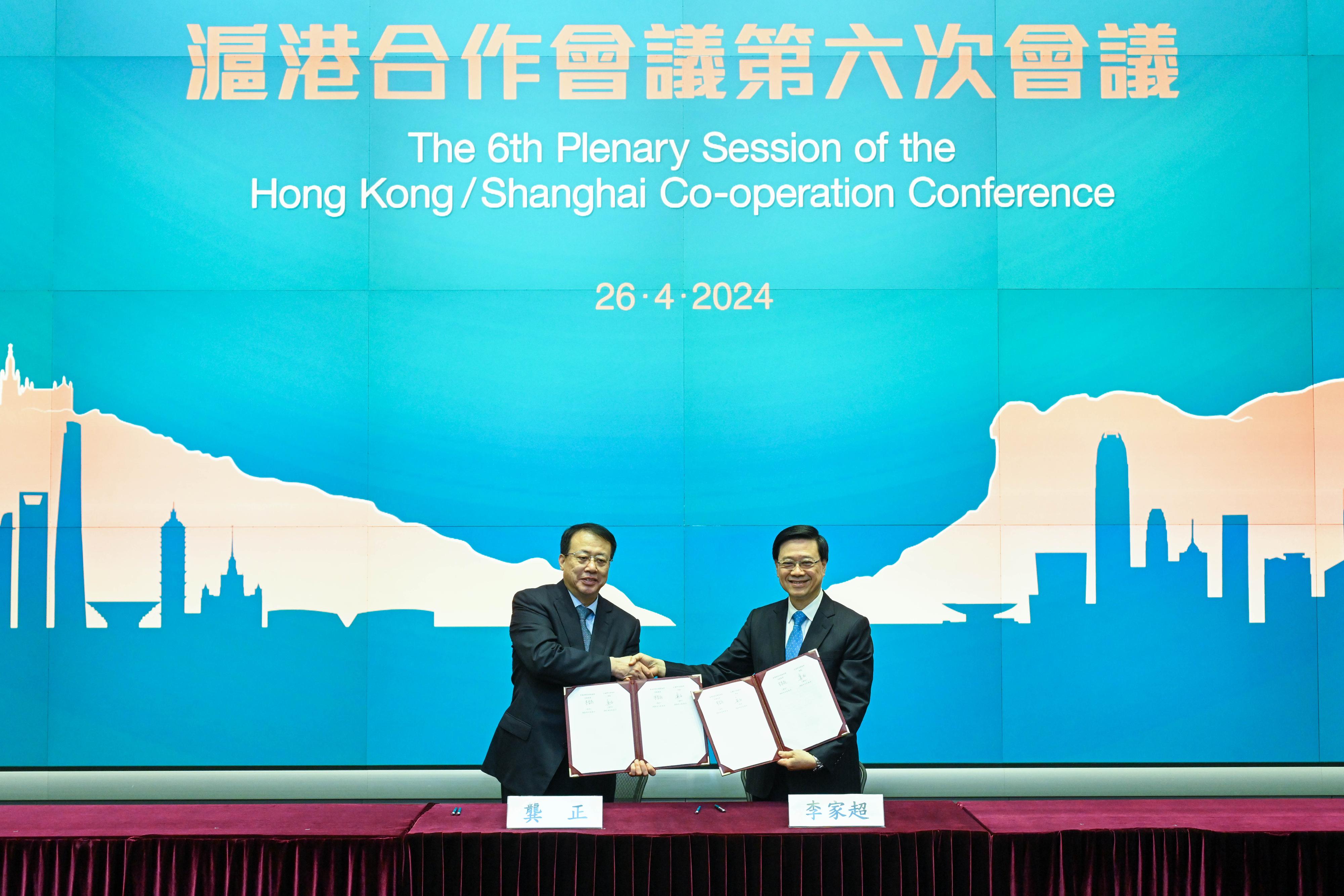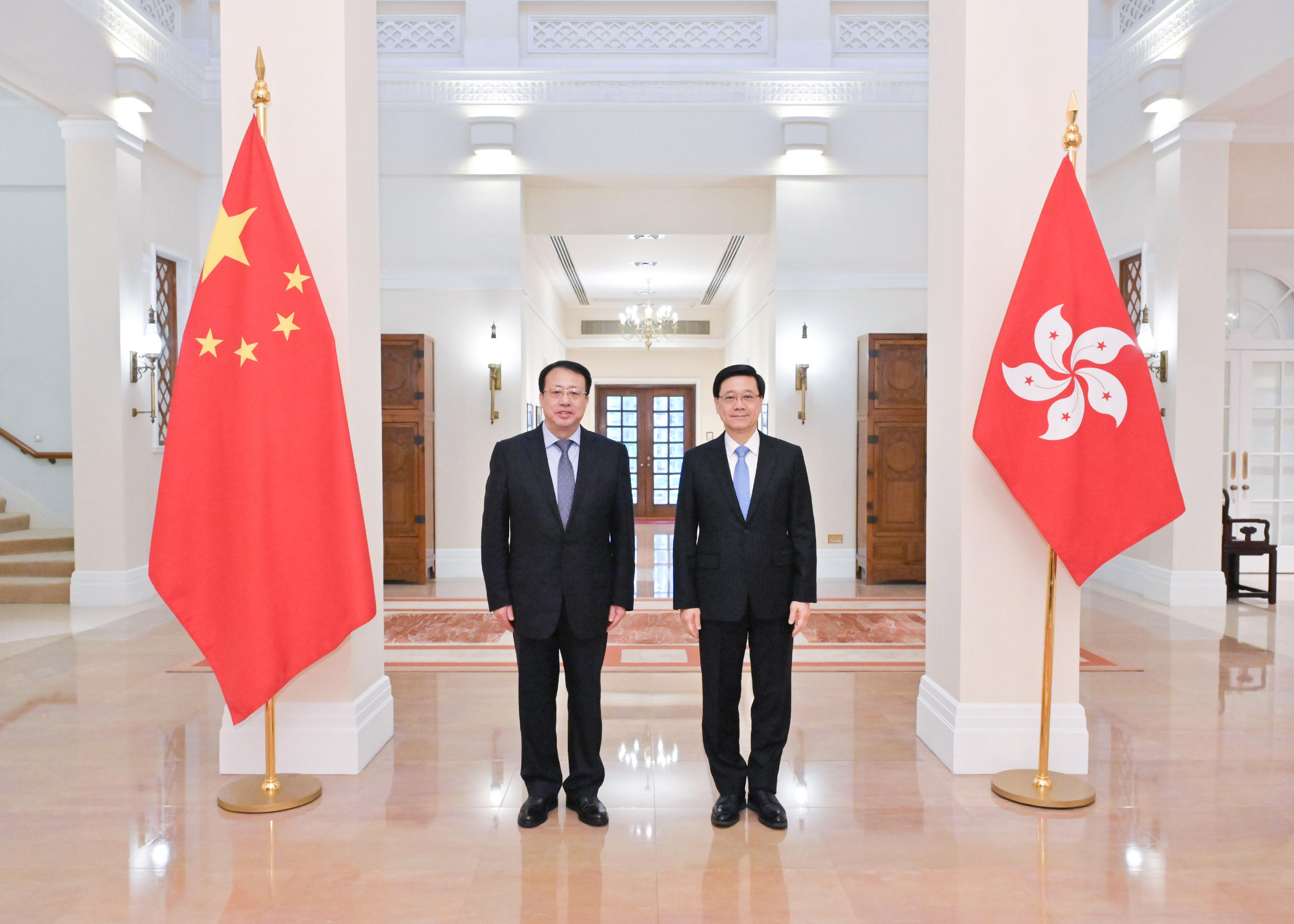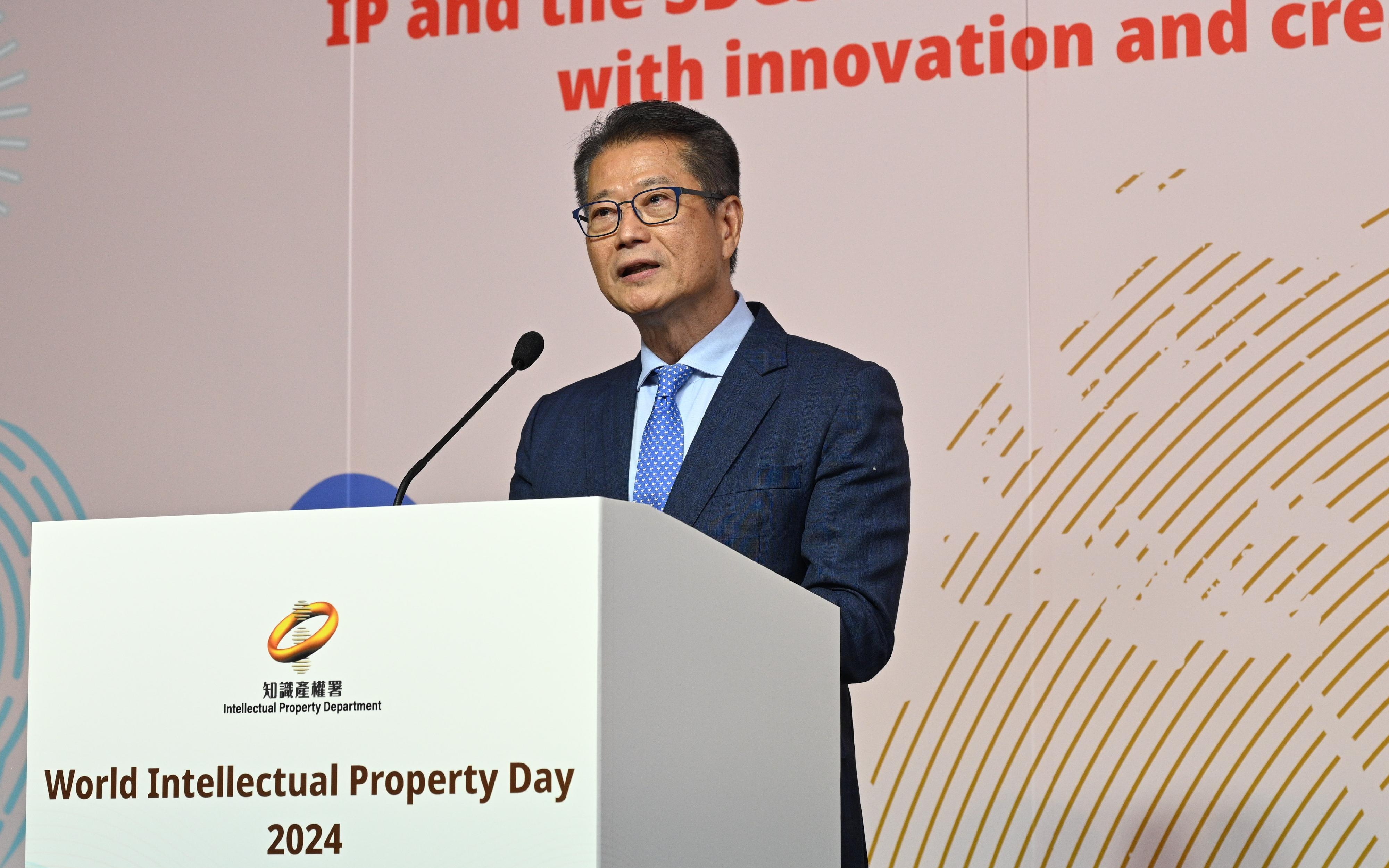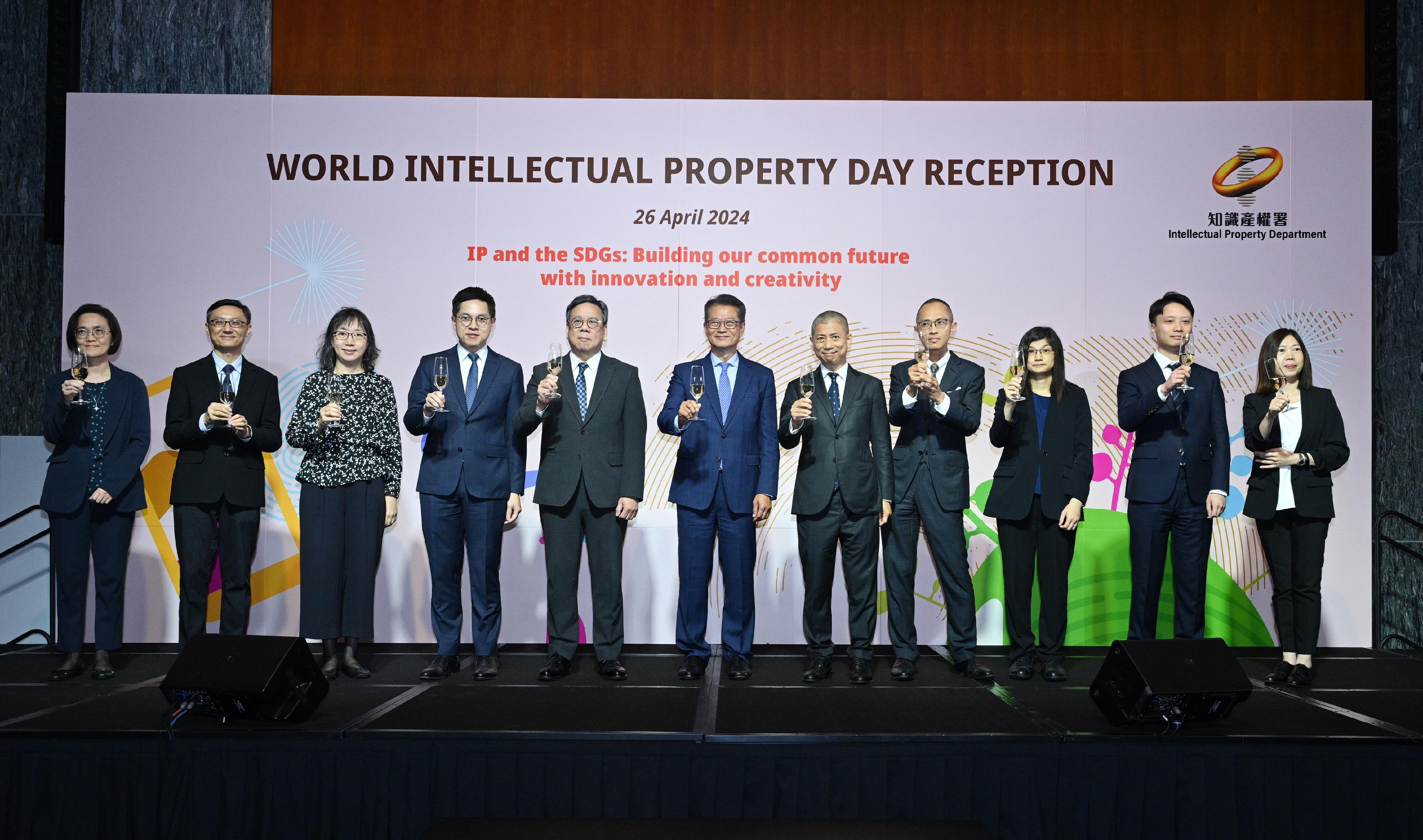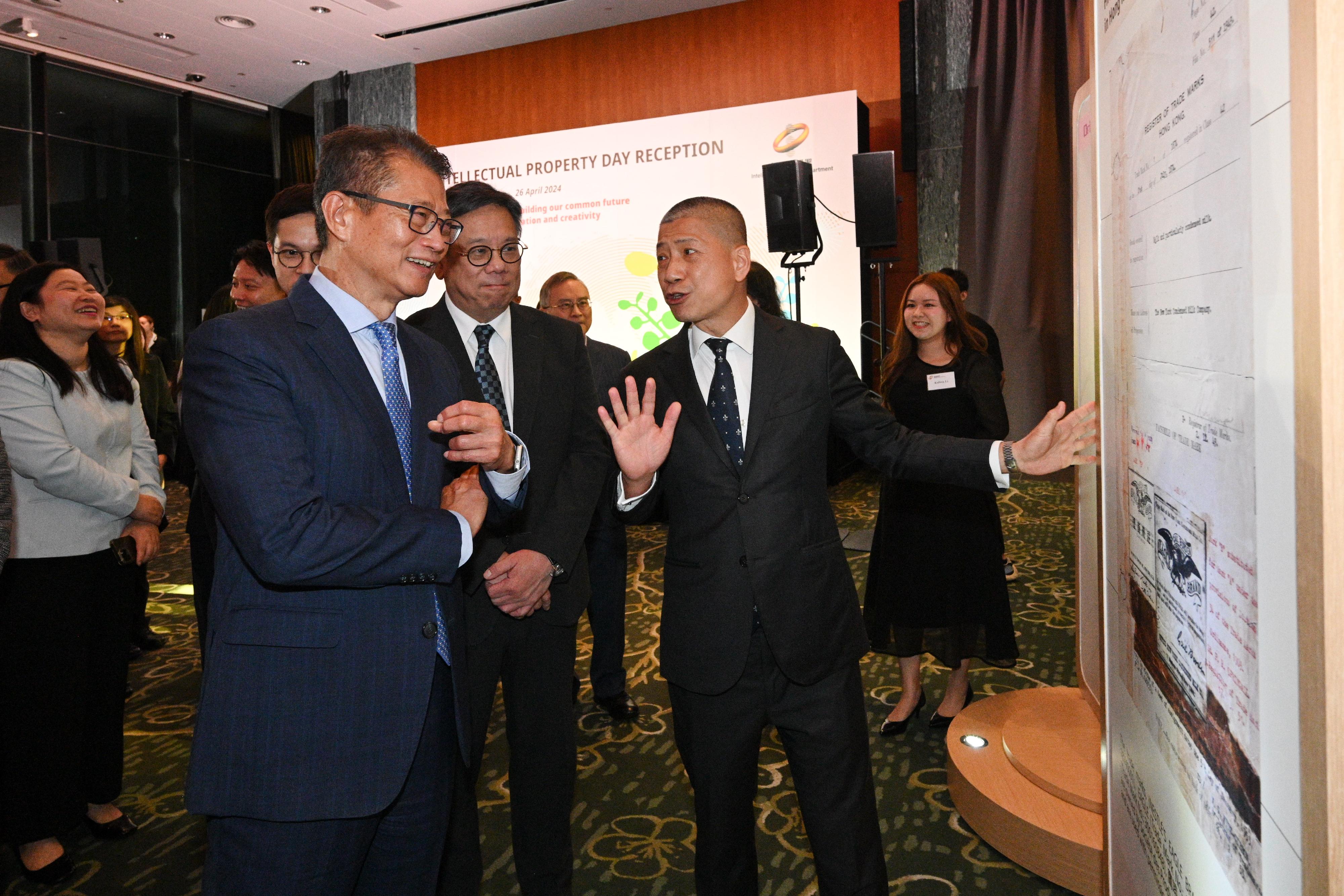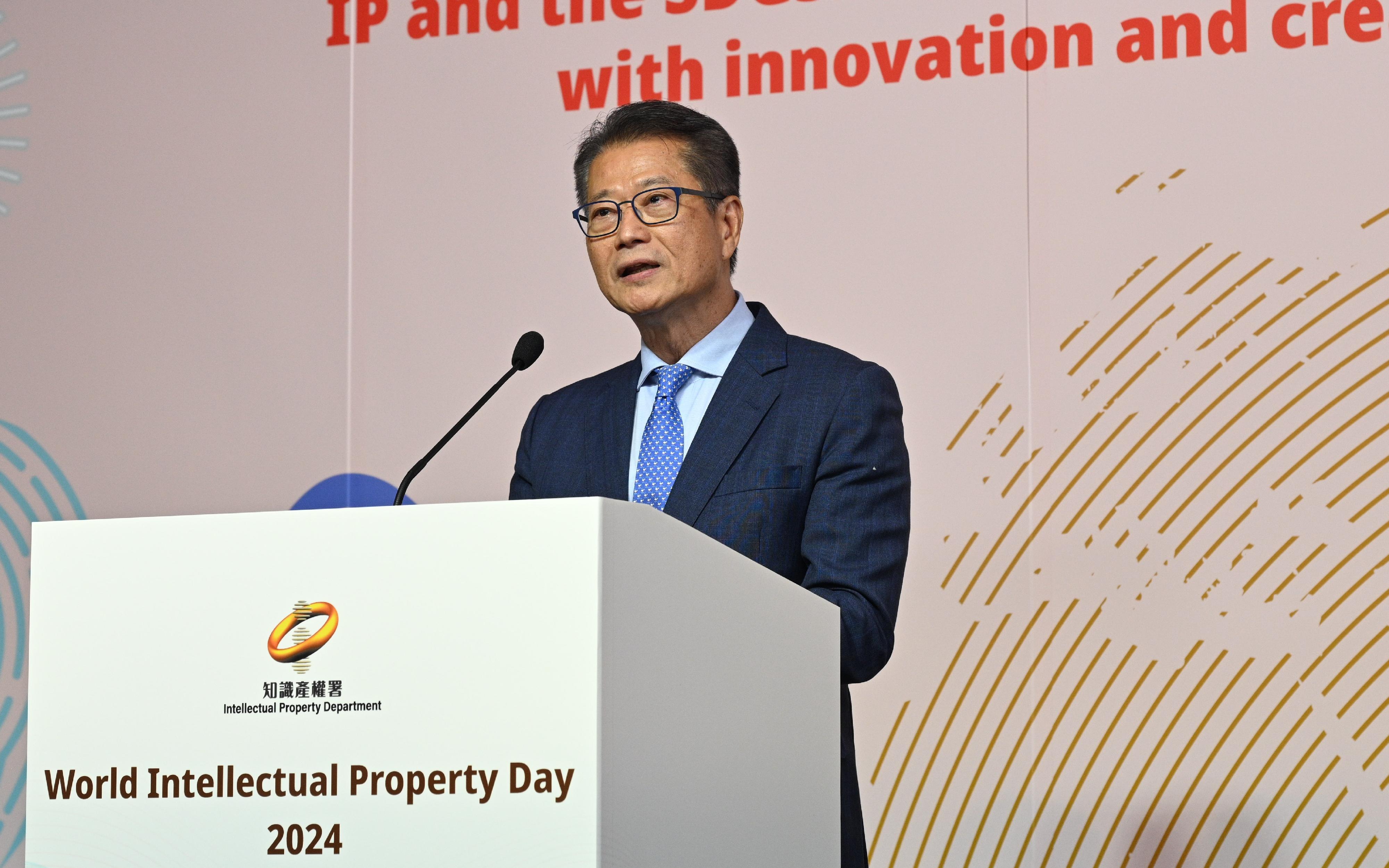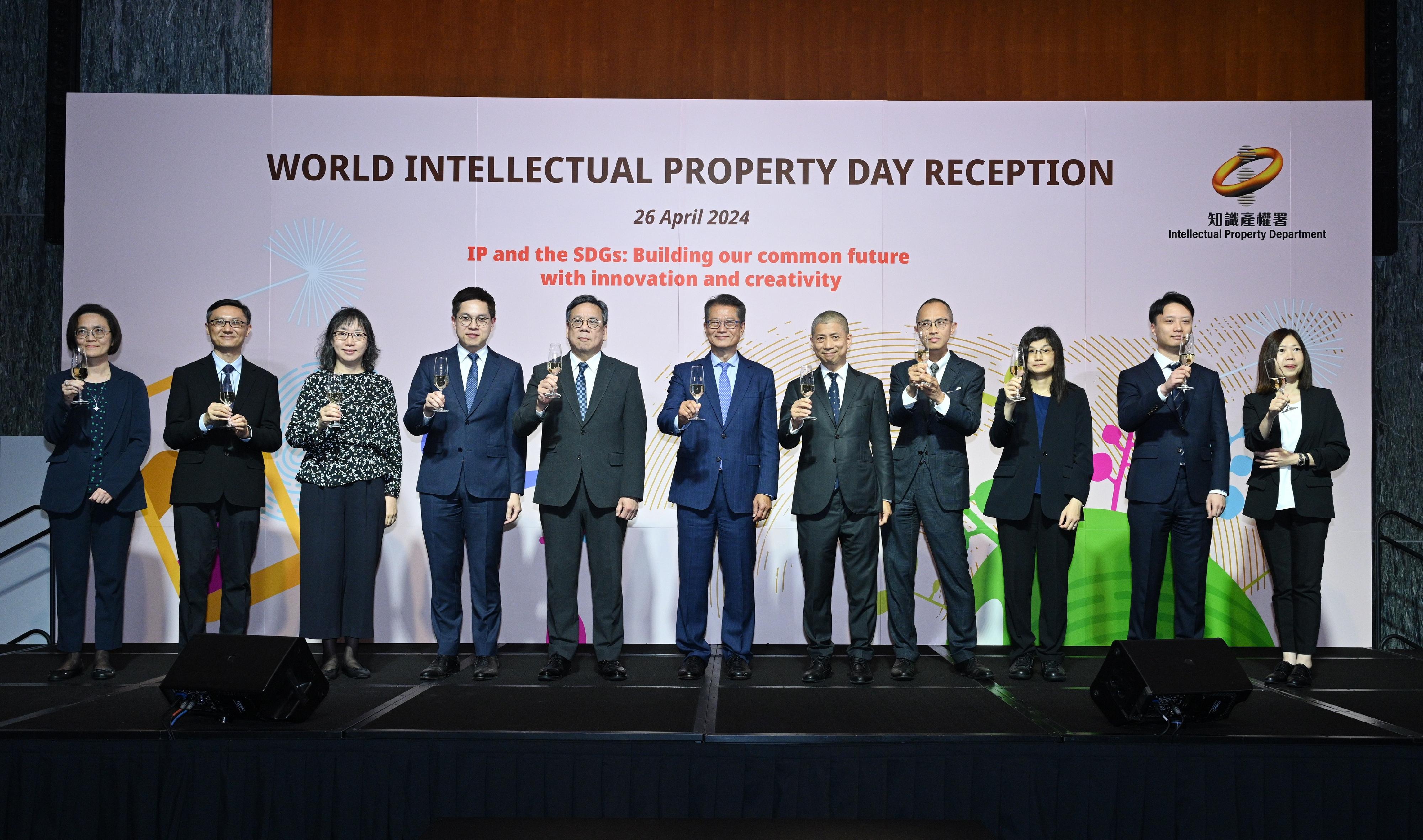The Chief Executive, Mr John Lee, and the Mayor of Shanghai, Mr Gong Zheng, leading the delegations of the governments of Hong Kong Special Administrative Region (HKSAR) and Shanghai respectively, held the Sixth Plenary Session of the Hong Kong/Shanghai Co-operation Conference (the plenary) in Hong Kong today (April 26).
Deputy Director of the Liaison Office of the Central People’s Government in the HKSAR, Mr Yin Zonghua; the Director of Bureau III of the Hong Kong and Macao Work Office of the Communist Party of China Central Committee and the Hong Kong and Macao Affairs Office of the State Council, Mr Zou Jinsong; and the Vice Mayor of Shanghai, Mr Hua Yuan also attended the plenary. Officials of the HKSAR Government that attended the plenary include the Financial Secretary, Mr Paul Chan; the Secretary for Justice, Mr Paul Lam; the Secretary for the Financial Services and the Treasury, Mr Christopher Hui; the Secretary for Health, Professor Lo Chung-mau; the Secretary for Development, Ms Bernadette Linn; the Director of the Chief Executive’s Office, Ms Carol Yip; and the Under Secretary for Constitutional and Mainland Affairs, Mr Clement Woo, etc.
Mr Lee said that the Hong Kong/Shanghai Co-operation Conference has always received great attention and strong support from the central government and the Shanghai Municipal Government. Since the First Plenary Session in 2003, exchanges between the two places have become increasingly frequent. Hong Kong has become one of Shanghai’s major export markets and Shanghai’s largest source of foreign investment. Shanghai is the leading city in the Yangtze River Delta urban agglomeration, while Hong Kong is the core city in the Guangdong-Hong Kong-Macao Greater Bay Area.
Mr Lee added that the plenary held today is another important milestone of the Hong Kong/Shanghai Co-operation, establishing a clear direction for future co-operation between the two places and further expanding co-operation between the two places in different fields. Looking forward, Hong Kong will continue to utilise its unique advantages of enjoying strong support of the motherland and being closely connected to the world being under “one country, two systems” principle, deepen sustained co-operation with Shanghai, jointly develop new quality productive forces of both sides, and jointly contribute to the country’s high-quality development.
Hong Kong and Shanghai reached consensus on the following 15 co-operation areas at the meeting:
Joint Pursuit of the Belt and Road Development and Business Investment
——————————————————————————————–
To support Hong Kong enterprises to participate in the China International Import Expo (CIIE) to engage in trade networking with Shanghai enterprises. To leverage Hong Kong’s role as a platform for international business and trade for promoting market development of the enterprises of the two places.
Facilitate bilateral high-level visits and increase the rate of exchanges and visits of trade and economic delegations. Encourage enterprises from Shanghai to seek business opportunities overseas through Hong Kong under the RCEP framework, and facilitate more Hong Kong enterprises to develop the Shanghai market and integrate into the nation’s supply and innovation chains.
Strengthen the work of the two places on promoting the Belt and Road Initiative, encourage Shanghai enterprises to actively participate in the Belt and Road Summit held in Hong Kong; and encourage Shanghai enterprises to actively participate in the Mainland Enterprises Partnership Exchange and Interface Session held by the HKSAR Government for direct matching with professional service sectors in Hong Kong.
Innovation and Technology
———————————-
Further encourage and support co-operation between higher education institutions, institutes, research and development organisations and enterprises in the two places in basic research, frontier technologies, key industries, etc.
Accelerate the two-way transformation of outstanding technological achievements in Shanghai and Hong Kong, encourage the jointly cultivated high-quality technology companies to list in Hong Kong for financing. Strengthen co-operation in technology, talents and capital to promote the transfer and transformation of more technological achievements.
Actively create a Shanghai-Hong Kong artificial intelligence base to accelerate the development of new quality productive forces through in-depth co-operation of industrial sectors, social organisations, higher education institutions and sectoral enterprises of Shanghai and Hong Kong.
Digital Economy
——————-
Promote the synergy of digital economy in Shanghai and Hong Kong. Facilitate the development of digital industries, co-operation in infrastructure and cross-boundary application of digital infrastructural facilities, nurturing of digital talents and enhancement of digital literacy, as well as collaboration in industrial spaces and communication platform.
Promote data co-operation between Shanghai and Hong Kong. Facilitate mutual recognition of electronic authentication, development of data element market and co-operation in the field of financial payment, as well as sharing of open data.
Finance
———
To encourage Hong Kong financial institutions to seize the opportunities brought by the financial opening up of our country to establish or invest in banking, insurance, securities and fund institutions in Shanghai, and to expand the scope of business of their subsidiary institutions in Shanghai in accordance with the law.
To orderly promote mutual access between the financial markets and financial infrastructure of the two places, explore expanding the scope of mutual access between stock markets, promote the enhancement of the mutual access mechanism between the bond markets of the Mainland and Hong Kong, deepen the development of Northbound and Southbound channels, and enrich product suite and mechanisms.
To support the financial markets and financial institutions of the two places to strengthen co-operation on product development, services and innovation relating to green finance. To strengthen research collaboration and mutual recognition of standards between the two places in respect of green finance standards.
Civil Aviation, Maritime Transport and Logistics
———————————————
The Shanghai Shipping Exchange will enhance interaction and connection with the panelists of the Shanghai Shipping Index in Hong Kong; and strengthen co-operation between Hong Kong and Shanghai in ship financing promotion services.
Continue to take forward pilot projects of the two airports in such areas as the development of “flight shuttle services”, speedy customs clearance, streamlining of procedures, application of new technologies and innovations.
Cultural and Creative Industries
—————————————-
To further promote exchanges and co-operation of licensed Hong Kong broadcasters and Radio Television Hong Kong with Shanghai broadcasters in the fields of documentaries, television dramas, animations and broadcasting programmes.
To support collaborations of the advertising industries and organisation of competitions on creative advertising in Shanghai and Hong Kong. To encourage advertising enterprises in both places to develop cross-border trading services.
To promote the co-operation of the cultural and creative parks in Shanghai and Hong Kong; facilitate the collaboration and exchange between Shanghai and Hong Kong enterprises and outstanding designers; and establish the ecosystem for integration and co-existence of Shanghai and Hong Kong fashion products industry.
Education and Talent Development
——————————————–
To support the development of the Shanghai-Hong Kong University Alliance, and more primary and secondary schools in Hong Kong and Shanghai to form sister school pairs.
Continue to promote and deepen exchanges between civil servants of both places. Explore formulation of the plan for the next round of the staff exchange programme and the specific arrangements under the guidance of the Hong Kong and Macao Work Office of the CPC Central Committee.
Forge a comprehensive partnership between the Shanghai Talent Bureau and the Hong Kong Talent Engage, as well as a mechanism for regular communication and exchange, so as to promote collaboration on nurturing talents and talent services.
Youth Development
————————
Strengthen exchanges between youths of the two places on urban development and youth innovation and entrepreneurship. Support the organisation of short-term experiential programmes at innovation and entrepreneurial bases.
Continue to enhance various Hong Kong youth exchange and internship programmes in the Mainland; Shanghai would proactively provide better exchange and internship opportunities for Hong Kong young people.
Legal Services
——————
Support and facilitate greater business collaboration between the legal services sectors of the two places, and continue to give active support for law firms in Hong Kong and the Mainland to set up partnership associations in Shanghai, Hong Kong legal practitioners to be employed as legal consultants of Shanghai’s law firms, and law firms in both places to set up branches at the other side, etc.
Support and facilitate the legal, arbitration, mediation and other related services sectors of the two places to develop exchange platforms and engage in co-operation, training and exchange of talents.
Environmental Governance
———————————
Strengthen the scientific research co-operation between the two places on comprehensive atmospheric environment management and health impact assessment.
Enhance the technical exchanges and co-operation between the two places on urban noise pollution prevention works and management.
Strengthen the co-operation between the two places on ecological and environmental industries, and promote the market matching and collaboration of ecological and environmental enterprises between the two places.
City Planning and Management
—————————————
Strengthen exchange and co-operation between the two places comprehensively in respect of urban construction and management. Establish a normalised co-operation mechanism in urban renewal, high productivity construction, sponge city development, flood protection and disaster management.
Promote and support co-operation between the two places in conservation, revitalisation and utilisation of built heritage, sharing of archaeological research findings, exchange on exhibitions as well as nurturing of talents.
Healthcare
————-
To promote exchanges of Chinese medicine academics, talents and experts between the two places, to take forward the implementation of the Training Programme of Advanced Clinical Talents in Chinese Medicine and related programmes co-organised by the National Administration of Traditional Chinese Medicine and the Health Bureau, and to strengthen the co-operation between the two places in the area of internationalisation and standardisation of Chinese medicine.
To actively promote co-operation between the two places in the high quality development of public hospitals.
To strengthen collaboration and exchanges between the two sides in the areas of prevention and control of infectious diseases, health emergency response, and health promotion and the safety of blood transfusion.
To deepen co-operation between the two places in the areas of regulatory regime and measures and safety of pharmaceutical products.
Sports
——–
Promote the cultivation of high quality sports talents through co-operation among sports associations and with elite sports institutes, and jointly enhance the level of specialised training, sports rehabilitation and administration.
Social Welfare Services
—————————-
Facilitate social organisations in Shanghai which are interested in strengthening exchanges and co-operation with Hong Kong by promoting liaison and co-operation between welfare organisations, social organisations or charities of the two places.
Facilitation Measures for Hong Kong People in the Mainland
————————————————————————–
Further expand the scope of application of the Mainland Travel Permits for Hong Kong and Macao Residents in various government and public services in Shanghai; offer Hong Kong talents working in Shanghai with overseas talent residence permits, public employment services, social security, and labour rights, etc., to facilitate Hong Kong people to work and set up business in Shanghai.
Co-operation Memorandum Signing Ceremony
———————————————————-
At the meeting, the Chief Executive, Mr John Lee, and the Mayor of Shanghai, Mr Gong Zheng, signed the “Co-operation Memorandum of the Sixth Plenary Session Hong Kong/Shanghai Co-operation Conference”. The document (Chinese only) is at Annex 1.
In addition, twenty co-operation agreements were signed by government departments, statutory bodies and relevant organisations of the two places:
(i) Arrangement on Legal Exchange and Co-operation between the Department of Justice of the Hong Kong Special Administrative Region and the East China University of Political Science and Law;
(ii) Agreement on Enhancing Hong Kong-Shanghai Financial Co-operation;
(iii) Memorandum of Understanding on Healthcare Co-operation between the Shanghai Municipal Health Commission and the Health Bureau of the Government of the Hong Kong Special Administrative Region;
(iv) Letter of Intent to strengthen co-operation in urban planning and construction management between Shanghai and Hong Kong;
(v) Letter of Intent to strengthen co-operation in total water management between Shanghai and Hong Kong;
(vi) Memorandum of Understanding on the Organising of the “Shanghai Culture Week” series during the “Chinese Culture Festival” in Hong Kong in 2024;
(vii) Memorandum of Understanding between the Science and Technology Commission of Shanghai Municipality and the Innovation and Technology Commission of the Government of the Hong Kong Special Administrative Region on Enhancing Shanghai/Hong Kong Innovation and Technology Co-operation;
(viii) Letter of Intent to deepen exchange and co-operation on archaeology and built heritage between the Development Bureau of the Government of the Hong Kong Special Administrative Region and the Shanghai Municipal Administration of Culture and Tourism (Shanghai Municipal Administration of Cultural Heritage);
(ix) Memorandum of Understanding between Shanghai Media Group and Radio Television Hong Kong;
(x) Co-operation Agreement between the Orient International (Holding) Co. Ltd. and the Create Hong Kong under the Culture, Sports and Tourism Bureau of the Hong Kong Special Administrative Region;
(xi) Memorandum of Understanding on Co-operation between Science and Technology Commission of Shanghai Municipality and Hong Kong Trade Development Council on Promoting Innovation and Development of Hong Kong and Shanghai Enterprises;
(xii) Memorandum of Understanding on Co-operation between Shanghai Municipal Commission of Commerce and Hong Kong Trade Development Council on Promoting High-quality Economic and Trade Co-operation;
(xiii) Memorandum of Understanding in Relation to Strategic Co-operation Framework between Power Station of Art and M+ at the West Kowloon Cultural District in Hong Kong;
(xiv) Memorandum of Understanding on Co-operation between Shanghai and Hong Kong on High-Quality Industrial Development by Shanghai Municipal Commission of Economy and Informatization and Hong Kong Productivity Council;
(xv) Memorandum of Understanding on Strategic Collaboration among Shanghai Huangpu District People’s Government, Shanghai Lingang Economic Development (Group) Co., Ltd. and the University of Hong Kong;
(xvi) Memorandum of Understanding on Strategic Collaboration among Shanghai Minhang District People’s Government, Shanghai Lingang Economic Development (Group) Co., Ltd. and the University of Hong Kong;
(xvii) Memorandum of Understanding on Strategic Collaboration between Shanghai Huangpu District People’s Government and the University of Hong Kong;
(xviii) Memorandum of Understanding between Council for the Promotion of International Trade Shanghai (Shanghai Chamber of International Commerce) and the Chinese General Chamber of Commerce, Hong Kong;
(xix) Memorandum of Understanding for Collaboration among the Shanghai Pilot Free Trade Zone Lingang Special Area Administration Committee, Shanghai Lingang Economic Development Group Co., Ltd. and Hong Kong Quantum AI Lab Ltd.; and
(xx) Memorandum of Co-operation between Shanghai History Museum and Hong Kong Maritime Museum.
The co-operation agreements (ii) to (viii) signed by the government departments of the two places (Chinese only) are at Annexes 2 to 8.
read more


